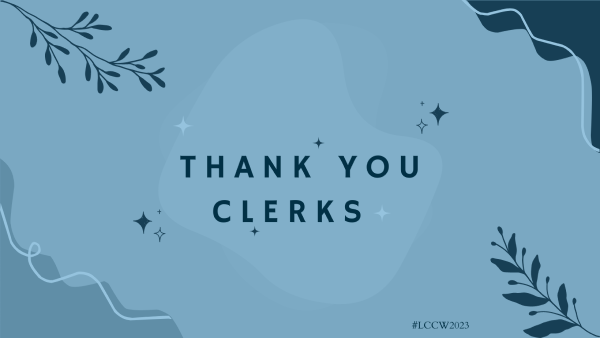
This week marks Local Council Clerks’ Week and we’d like to take a moment to say thank you to all the clerks across Devon working so tirelessly to benefit your councils and communities. Clerks do so much, often unseen. Clerks are professionals and serve around 10,000 councils across England and Wales. The role has changed enormously over time, but whatever your council is delivering for your community, your clerk is likely at the heart of getting it done. Local Council Clerks Week aims to help raise the profile of this important profession, explaining the work clerks do for their councils.
It can be a difficult role, with many different skills to master. Clerks perform administrative tasks for your council such as writing agendas, taking minutes and handling correspondence. However, as the council’s Proper Officer they are also expected to advise their council (even when that advice may not be what you want to hear!). The clerk’s position as an impartial officer allows them to offer guidance on what may be a prudent course of action, financially, legally, and procedurally. Clerks may also be the council’s Responsible Financial Officer, keeping the council’s accounts and presenting them for the council to monitor.
Clerks will also, variously, act as a line manager to other staff, manage volunteers or contractors, handle the council’s PR and marketing, act as a bookings clerk for any venues you may have, manage any projects the council is implementing, build relationships with other local authorities and partnership bodies, and much much more. They are the ones writing to MPs, liaising with principal authorities about potholes or bins, applying for grants, researching planning issues, managing buildings and events. They are also critical in a crisis which we saw when they helped coordinate community efforts during the pandemic; in many communities, parish councils and their clerks were the first to respond.
Understanding your clerk’s role on the council, and your own, can be critical to building a good relationship with your clerk that allows the council to function effectively as a team to best serve your community. The Civility and Respect Project Roles and Responsibilities Guidance may be helpful to understanding the different roles and responsibilities of people on the council.
The video opposite, produced by the Society for Local Council Clerks, provides more information about what clerks do, what they bring to the council and its community, and the role they play.
Since clerks cannot be self-employed, councils act as an employer to their clerk and as with all employees, have a duty of care towards them. If you’re unsure about your role as an employer, you may find The Good Councillor’s Guide to Employment helpful or check out our range of employment training.
The Civility and Respect Project is doing a lot of work in how councils can demonstrate that they are committed to standing up to poor behaviour across the sector and driving through positive changes. This includes a range of policies, guidance, podcasts and more to help your council develop a councillor-officer protocol, put in place a dignity at work policy, and make a strong statement on bullying and harassment.
As with any employment role, investment in training and development is essential to achieve high standards of performance, and support the council to operate effectively. We have a range of training available for clerks or staff at various points in their clerking journey including those who might be interested in taking the professional qualification, the Certificate in Local Council Administration (CiLCA). Any clerks interested in the CiLCA may want to contact us for more information about upcoming courses.
If you have a particularly fantastic clerk (and we think all clerks are!), then why not nominate them for Clerk of Year in the Star Council Awards? This is your opportunity to celebrate your clerk and the difference they have made in your community!
Being a Clerk can often feel an isolated role, especially for those working in smaller councils, often on their own. It is therefore important for Clerks to be part of a network and able to access peer support when needed. The Society of Local Council Clerks provides just that, and a local Devon branch meets several times a year.
This summer, DALC is working in partnership with the SLCC Devon Branch to host our Summer Socials; four events taking place across Devon. These free events are a perfect opportunity to network with other clerks around the county, to build relationships, access support, and meet officers from DALC and SLCC.